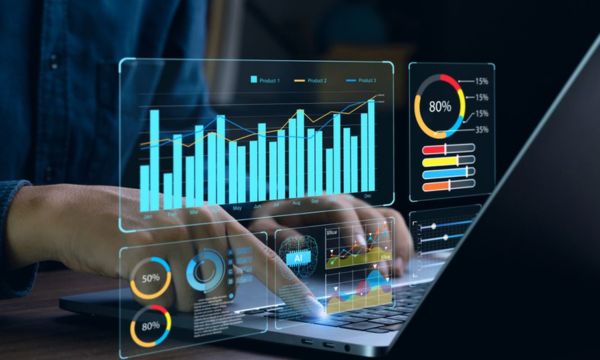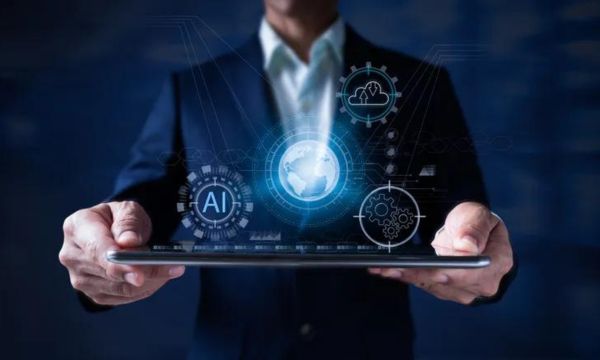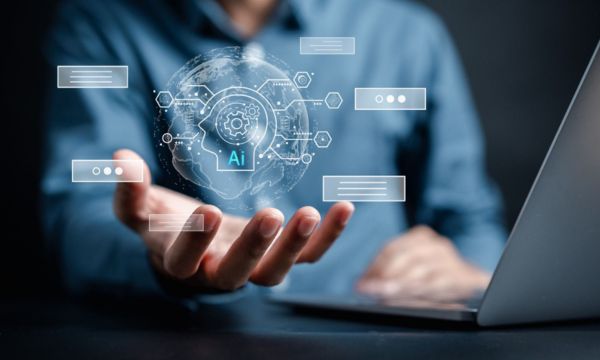The Future of Finance: AI and Blockchain Synergy
The financial world is about to undergo a major transformation. Artificial intelligence (AI) and blockchain technology are coming together in a way that could revolutionize the way standard financial systems work.
While these two advanced technologies are still evolving, their combination creates new ways for the financial sector to be more efficient, open, and secure.
This article explores how artificial intelligence and blockchain can work together to improve business and how this could change the future of business.
1. Business Artificial Intelligence:
Artificial intelligence has already made tremendous strides in the banking industry, improving operations, risk management, customer service, and decision-making.
Machine learning algorithms are extremely useful for analyzing large amounts of data to find useful insights, automate tasks, and find patterns that human analysts cannot see.
This means fraud can be more easily detected, personalized financial advice can be provided, and risk assessments can be more accurate.
A. Automation and Smarter Working
One of the most important things that artificial intelligence does for the banking industry is automate tasks.
Data analysis, insurance, and customer service used to be difficult and time-consuming. Now, artificial intelligence makes these tasks faster and easier.
This not only speeds up the process but also reduces the chance of people making mistakes, making everything run more smoothly overall.
B. Predictive Analytics
Financial institutions can make better choices with the help of the predictive analytics of artificial intelligence.
Machine learning models can predict market movements, formulate optimal financial portfolios, and guess how customers will trade by looking at past data and spotting trends.
This type of planning helps finance professionals stay ahead and make informed choices based on data-driven insights.
C. Customized Banking Services
The way banking services are delivered is changing due to AI-powered personalization.
By studying how and why people spend their money, AI systems can ensure that product recommendations, investment strategies, and financial advice are tailored to the needs of each customer.
This not only makes customers more satisfied but also allows financial companies to understand their customers better.
2. Blockchain and Currency:
Blockchain, the technology behind cryptocurrencies such as Bitcoin, has received widespread attention for its independence and openness.
Blockchain has the potential to revolutionize the way finance works by creating a secure, permanent, and widely shared record of all financial activity.
This technology eliminates the need for intermediaries, reduces fraud, and increases transparency, revolutionizing the way financial transactions are conducted.
A. Separation of Powers and Openness
Decentralization is why blockchain technology works. This means that no single organization can control the entire network.
This decentralization improves security by eliminating the weaknesses associated with centralized systems.
Additionally, because the blockchain ledger is open and cannot be changed, everyone involved in a financial transaction sees the same data.
This reduces the chance of scams and errors.
B. What is a Smart Contract?
Blockchain allows contracts to be “smart,” meaning they can enforce their terms by writing them directly into code.
This eliminates the need for intermediaries and automatically fulfills contractual obligations when certain conditions are met.
In finance, smart contracts can speed up tasks such as settlement and reduce the time and money required to execute standard contracts.
C. Cross-Border Transactions
Blockchain is ideal for cross-border transactions because it is decentralized and uses cryptography to ensure information security.
When you do business with other countries the traditional way, there are often delays, costs and the need for many intermediaries.
By eliminating multiple verification steps and the need for currency exchange, blockchain can make cross-border transactions faster and cheaper.
3. How AI and Blockchain Work Together:
Both artificial intelligence and blockchain can change things individually, but when they work together, they really come into their own. When artificial intelligence and blockchain work together, they will create a solid foundation for a smarter, more secure, and more efficient financial environment.
A. Better Security
When artificial intelligence and blockchain work together, they can solve common security problems in financial companies.
Algorithms powered by artificial intelligence look for patterns and spot outliers, adding an extra layer of protection against fraud.
At the same time, blockchain’s decentralized and impenetrable logs protect the accuracy of financial information, making it virtually impossible for bad actors to alter data.
B. Detect and Stop Fraud
Artificial intelligence machine learning algorithms are very good at detecting meaningless trends and behaviors. When artificial intelligence is combined with blockchain, it can instantly sense transactions and notice strange behavior, making it easier to detect and stop fraud before it happens.
This proactive approach reduces the risk of financial fraud and makes the entire financial system more secure.
C. Make Better Choices
When artificial intelligence is used to analyze data and blockchain is used to create clear and reliable ledgers, it can help financial companies make better decisions faster.
When artificial intelligence and blockchain work together, they can provide a complete view of financial data so people can make better decisions.
This is true whether they are calculating someone’s creditworthiness, finding the best investment strategy, or calculating how risky a transaction is.
4. Questions and Things to Think About:
Although the combination of artificial intelligence and blockchain is very useful in the banking industry, there are still some problems and issues that need to be taken into account.
A. Follow the Rules
Because AI and blockchain technologies are constantly changing, it can be difficult to ensure they follow the rules.
Financial companies must deal with a multitude of rules and regulations to ensure that their use of artificial intelligence and blockchain is legal and ethical.
B. Growth Capacity
Scalability remains an issue, especially as financial firms look to adopt these technologies more widely.
As the number of transactions increases, it is important that artificial intelligence and blockchain technology keep pace with the needs of the financial ecosystem.
C. Integration Costs
Putting artificial intelligence and blockchain solutions into practice requires significant capital and technical knowledge.
To ensure healthy and sustainable implementation, financial institutions must carefully weigh the costs of integration against the likely long-term benefits.

The-Future-of-Finance-AI-and-Blockchain-Synergy (Source – Google)
Conclusion:
Artificial intelligence and blockchain technology are the two most important technologies for the future of business. As these technologies are further developed and improved, they can make the financial system more secure, efficient and open.
Although there are some problems, the combination of artificial intelligence and blockchain can also bring many benefits.
This makes this merger an exciting way to change the future of banking. Financial institutions that take advantage of this synergy are likely to bring new ideas and good changes to the sector.
FAQs:
1. What are the key concepts of integrating artificial intelligence and blockchain in the financial field?
The integration of artificial intelligence and blockchain in the financial sector aims to revolutionise traditional systems by combining the data analysis capabilities of artificial intelligence with the decentralisation and transparency of blockchain.
This synergy is expected to increase the efficiency, security, and transparency of financial transactions.
2. What contribution does artificial intelligence make to the financial sector?
Artificial intelligence contributes to the financial sector by automating tasks, increasing efficiency, and providing predictive analytics.
It improves decision-making processes, detects fraud, and enables personalised financial services by analysing large amounts of data and identifying patterns that human analysts may miss.
3. What role does blockchain play in the financial field?
Blockchain technology in the financial sector offers decentralisation, transparency, and security. It eliminates the need for intermediaries, reduces fraud, and introduces smart contracts to execute agreements automatically and securely.
Blockchain also enables faster and more cost-effective cross-border transactions.
4. How can the collaboration between artificial intelligence and blockchain increase financial security?
The synergy between AI and blockchain improves security by combining AI’s ability to analyse patterns and detect anomalies with blockchain’s decentralised and tamper-proof ledger.
This combination provides powerful protection against fraudulent activity and ensures the integrity of financial information.
5. How can artificial intelligence and blockchain improve financial decision-making?
Artificial intelligence and blockchain improve financial decision-making by providing a holistic view of financial data.
The data analytics capabilities of artificial intelligence, combined with blockchain’s transparent ledger, enable financial institutions to make smarter and faster decisions, whether assessing creditworthiness or transaction risk.
 Enhancing Investment Strategies with AI
Enhancing Investment Strategies with AI
In an ever-changing financial world, it is essential to stay ahead when making smart business decisions. AI […]
More AI-Powered Stock Market Predictions for Smart Investing
AI-Powered Stock Market Predictions for Smart Investing
In the ever-changing stock market, it is important to stay ahead of the curve for successful buying. […]
More Advanced AI Solutions for Risk Management
Advanced AI Solutions for Risk Management
In the rapidly changing business world, risk management has become an important part of ensuring a company’s […]
More